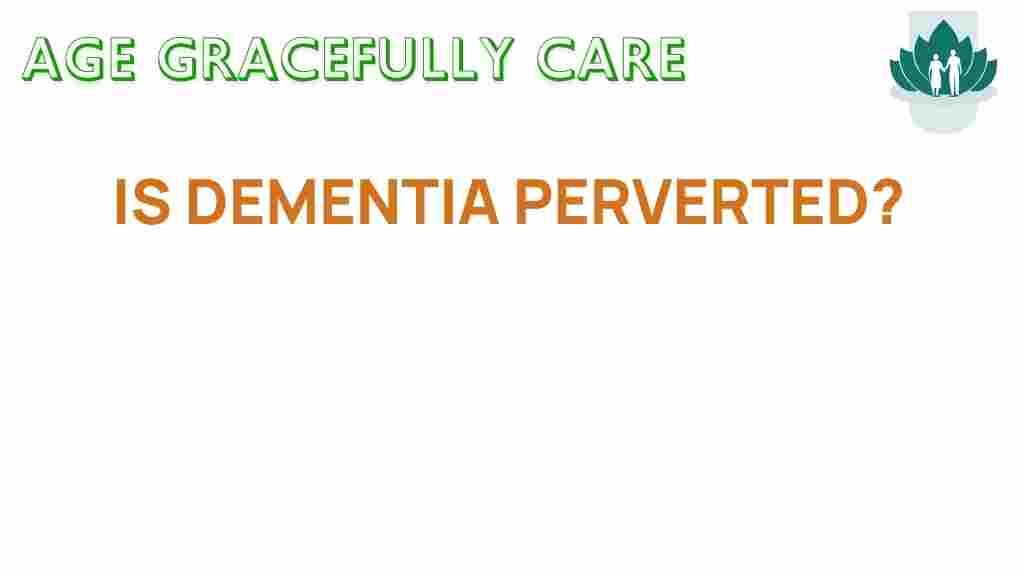Is Dementia a Perverted Disease? Understanding Dementia and Its Impact on Brain Function
Dementia is a term that encompasses a variety of neurological disorders that result in cognitive decline, affecting memory, thinking, and social abilities severely enough to interfere with daily life. Many people, when they hear the term ‘dementia’, often associate it with a list of symptoms and behaviors that can seem perplexing and sometimes even distressing. However, it is crucial to understand that dementia is not a ‘perverted’ disease; rather, it is a complex condition that impacts millions of individuals and their families around the world.
In this article, we will delve deep into the nature of dementia, exploring its symptoms, types, emotional impact, and the importance of caregiving. We aim to unravel the mysteries of the mind affected by this condition while maintaining a focus on mental health and patient experiences.
Understanding Dementia
Dementia is not a single disease but a general term that describes a decline in mental ability severe enough to interfere with daily life. It is an umbrella term that covers various types of cognitive decline, including Alzheimer’s disease, vascular dementia, Lewy body dementia, and frontotemporal dementia.
- Alzheimer’s Disease: The most common form of dementia, characterized by memory loss and cognitive impairment.
- Vascular Dementia: Often caused by strokes or other issues that affect blood flow to the brain.
- Lewy Body Dementia: Associated with abnormal protein deposits in the brain, leading to cognitive fluctuations and visual hallucinations.
- Frontotemporal Dementia: Primarily affects the frontal and temporal lobes of the brain, impacting personality and behavior.
The Symptoms of Dementia
Understanding the symptoms of dementia is crucial for early diagnosis and treatment. Common symptoms include:
- Memory loss that disrupts daily life
- Challenges in planning or solving problems
- Difficulty completing familiar tasks
- Confusion with time or place
- Changes in mood and personality
These symptoms can vary from person to person, and not everyone will experience all of them. Moreover, the progression of dementia can lead to severe impairments in brain function, affecting the individual’s ability to communicate, reason, and understand.
The Emotional Impact of Dementia
The emotional impact of dementia on both patients and caregivers cannot be overstated. Individuals diagnosed with dementia often experience feelings of confusion, frustration, and fear as they navigate their cognitive decline. This emotional turmoil can lead to:
- Depression
- Anxiety
- Social withdrawal
Caregivers, too, face significant emotional challenges as they support their loved ones. They may experience:
- Burnout and fatigue
- Feelings of isolation
- Guilt and helplessness
Support networks and mental health resources are essential for both patients and caregivers to manage these emotional impacts effectively.
Caregiving for Dementia Patients
Caregiving for individuals with dementia involves unique challenges and responsibilities. Caregivers play a critical role in maintaining the quality of life for those experiencing cognitive decline. Here are some strategies to enhance caregiving:
- Educate Yourself: Understanding dementia and its symptoms can help caregivers anticipate challenges and respond appropriately.
- Establish Routines: Creating a consistent daily routine can provide a sense of stability for the patient.
- Communicate Effectively: Use simple language and maintain eye contact to help the patient understand.
- Be Patient: Recognize that cognitive decline can make tasks challenging for the patient; patience is key.
- Seek Support: Joining support groups can provide caregivers with emotional relief and practical advice.
For more information on caregiving strategies, you can visit this resource.
The Role of Mental Health in Dementia
Mental health plays an integral role in the management of dementia. Addressing mental health issues such as depression and anxiety can significantly affect the quality of life for both patients and caregivers. Here are some ways to promote mental well-being:
- Encourage Social Interaction: Regular social engagement can combat feelings of isolation.
- Promote Physical Activity: Exercise has been shown to improve mood and overall health.
- Focus on Nutrition: A balanced diet can positively influence brain health.
- Utilize Therapy: Professional counseling can provide support and coping strategies.
Step-by-Step Process for Coping with Dementia
Managing the challenges of dementia involves a systematic approach. Here’s a step-by-step process to help navigate this journey:
- Recognize the Symptoms: Be aware of the early signs of cognitive decline.
- Seek Medical Advice: Consult with a healthcare professional for an accurate diagnosis.
- Develop a Care Plan: Work with healthcare providers to create a comprehensive care plan tailored to the patient’s needs.
- Engage Support Services: Utilize community resources and support groups.
- Monitor Progress: Regularly assess the patient’s condition and adjust the care plan as needed.
Troubleshooting Common Challenges
As dementia progresses, caregivers may encounter various challenges. Here are some common issues and troubleshooting tips:
- Behavioral Changes: If the patient exhibits aggression or agitation, ensure a calm environment and consider consulting a healthcare professional for medication adjustments.
- Difficulty with Communication: Simplify language and use non-verbal cues to enhance understanding.
- Wandering: Implement safety measures, such as alarms or GPS devices, to prevent wandering.
- Refusal of Care: Approach the situation with empathy and patience, and try to understand the patient’s perspective.
Conclusion
Dementia is a complex condition that affects not only the individual diagnosed but also their family and caregivers. It is not a ‘perverted’ disease but rather a serious neurological disorder that requires understanding, compassion, and effective care strategies. By acknowledging the emotional impact of dementia, promoting mental health, and employing effective caregiving techniques, we can improve the quality of life for those affected.
As we continue to unravel the mysteries of the mind, it is vital to foster awareness and support for individuals facing cognitive decline. If you or someone you know is struggling with dementia, reach out for help. Remember, you are not alone in this journey.
For further reading on dementia and caregiving, check out this comprehensive guide.
This article is in the category Health and created by AgeGracefullyCare Team
